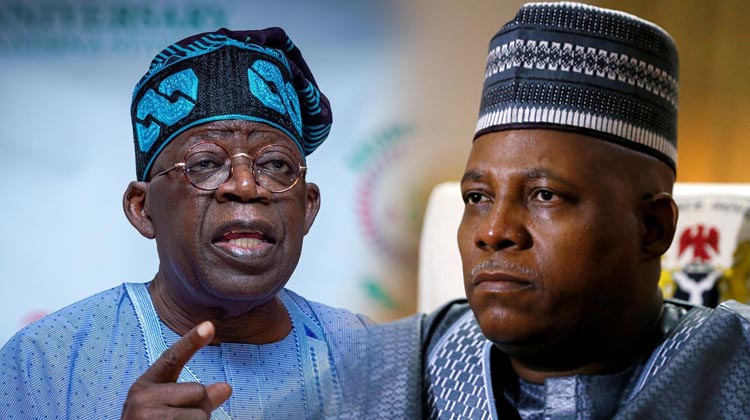By Ibidunni Banjoko
Public Affairs experts and economists have identified critical areas that are presently troubling Nigeria’s e economy, which they maintained should be of major concern to the incoming administration.
Organized by the Public Affairs Service of CMC Connect LLP recently, the 3rd National Policy Dialogue webinar with theme, “Setting a Fiscal Policy Agenda for The Bola Ahmed Tinubu Administration”, explored the areas of regulations, taxation, excise duties and other policies that are making the ecosystem unfriendly for business growth.
These areas include: Risk-unconscious, over-dependence on hydrocarbons – oil accounted for 90.5% of merchandise trade in 2022; Poor policy coordination – Expansionary fiscal operations, driven by massive borrowings vis-à-vis contractionary monetary policy; Fiscal inefficiency and revenue leakages – recourse to borrowing (it is relatively easy) and doing so inefficiently (largely through CBN), largely funding recurrent expenditure; Counterproductive fiscal policies- Fiscal Policy Reform (FPR) weakening manufacturing activities and new investments; Misplaced priorities – Deepening brown economy and disregarding sub-national comparative advantage, and discourages productivity and weak social compact.
In his welcome remarks, the moderator Mr. Yomi Badejo-Okusanya, founder and Lead Partner at CMC Connect LLP, said: “To achieve optimal growth and broadly shared prosperity, monetary policy must complement physical goals. What we seek to achieve is to bring out baseline facts and data on macroeconomic indicators from where Nigeria was in 2015 and where the nation is presently.”
The keynote speaker, a distinguished economist renowned for his expertise in fiscal policy, banking, finance, and public sector consulting, Dr. Biodun Adedipe, stated that fiscal inefficiency, revenue leakages, misplaced priorities, risk-unconscious over-dependence on hydrocarbons, poor policy coordination, and counterproductive fiscal policies are the major reasons Nigeria is in a bad shape.
“However, I believe this discourse will serve as a platform to tell the incoming government the need to engage the private sector deeply in formulating and reshaping economic policies that will make Nigeria and the productive sectors bounce back, thereby promoting a better Nigeria,” he said.
Dr. Adedipe eloquently elaborated on strategic directions for Bola Tinubu Government.
“What we are saying to Tinubu`s administration is to set an agenda for ourselves, to be in the top 10 economies in ten years’ time. In the immediate future, the incoming government should match non-oil revenue to recurrent spending, aggressively promote exports to the world market starting with African countries; strengthen domestic manufacturing, and interrogate the nexus between import and export tariffs,” he said.
Elaborating further, the policy expert and Chief Consultant at B. Adedipe Associates, recommended that the Tinubu government should ensure actionable, consistent and coherent fiscal, trade and monetary policies by promoting high level actions on policy coordination and ownership, unified voice on policy pronouncement, setting the right tone at the top, revamp reform on Ease of Doing Business, and evaluate policies based on deliverables. He espoused that the government must expand non-oil fiscal space, push for a tax/GDP ratio of 15% and above all, align fiscal, monetary and trade policies.
The dialogue had a panel of discussants from different sectors of the economy. They include Mr. Tilewa Adebajo, Chief Executive Officer of CFG Advisory; Mr. Vivian Ikem, Corporate Affairs and Communications Director at Japan Tobacco International; Mrs. Sade Morgan, Corporate Affairs Director at Nigerian Breweries Plc, ably represented by Mr. Uzo Odenigbo, Head of Public, External and Government Affairs, Nigerian Breweries Plc.
In his submission, Mr. Vivian Ikem, spoke about issues on policy consistency, stating that inconsistency in the government policies can affect the drive of foreign direct investments. He urged the incoming government to ensure consistency of policies and emphasized that it should ensure tight control of the illicit market and stop adulterated products from grey markets being dumped on the country. Nigeria, in its present state, he said, is a difficult place to do business, and the incoming government should endeavour to reform the current fiscal policy and the civil service.
Other panelists, which included Uzo Odenigbo and Tilewa Adebajo, submitted that the economy under the Tinubu administration should be data driven because data is key in comparative fiscal analysis with other markets, and in policy formulations. Adebajo advised that the incoming government should be people-centric in its policy formulations. Oil subsidy, he stated, should not be removed at once. “It has to be a gradual removal while refineries are being brought to optimal performance”.
The former Ogun State Commissioner for Commerce and Industry, Otunba Bimbo Ashiru, advised the incoming president to be very altruistic in his appointments into key positions that are germane to the success or otherwise of his administration. The former banker wants Mr. Bola Tinubu to follow in the footsteps of Chief Olusegun Obasanjo’s administration, by appointing Nigerians with the capacity to run the economy irrespective of tribe, religion, and party affiliation. He emphasized that the incoming administration should also prioritize agricultural transformation being the largest employer of labour and contributor to the gross domestic product of the economy.







Comment
No comments found.